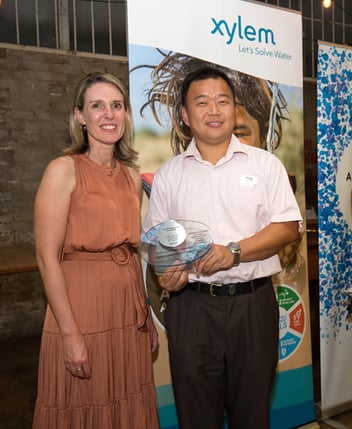High-tech greenhouses the key to growing a new Australian export industry
Australia has the potential to become the food bowl of Asia using a system of high-tech, water-efficient greenhouses.
“We’ve got the land, we’ve got the water and we’ve got the potential for renewable energy,” Tonkin Consulting Principal Water Engineer Neil Palmer said.
“We also have the geographic closeness [to Asia] and the stable political and economic systems to support agribusiness development, but we need people who have the energy and vision to make it happen.”
Palmer, who is presenting at the upcoming AWA NT Water in the Bush Conference, has been working on a project to create an agribusiness hub in the Adelaide Plains, which he said would bring jobs and economic development to the region.
The project would use recycled water from Adelaide’s Bolivar treatment plant to supply hydroponic greenhouses. These would produce fruit and vegetables that would be exported to markets in Asia.
A feasibility study conducted by Tonkin Consulting in 2016 showed $4 billion worth of investment in the project would create 4000 direct jobs and more than $2 billion of exports each year.
The system would be based on a successful European model, where 20,000 hectares of greenhouses supply the continent with fresh produce.
“The basic operational principle is you pick the stuff and within 48 hours it’s on a supermarket shelf somewhere in Europe. Our challenge is to do that in Australia and have it available in Asia,” Palmer said.
He said the growing middle classes across Asia represent large markets eager for healthy food and fresh produce that Australian farmers could tap into, provided they could ensure a large but consistent high-quality supply.
The vision, which Tonkin Consulting is also exploring in Queensland, includes the potential for farmers to grow food in a franchise model. The farmers would purchase and run high-tech greenhouses and then sell the produce to a company that would process and package it and send it overseas.
Although establishing the water infrastructure, greenhouses, packaging and processing, transport and export strategies for a large new export industry would be a challenge, Palmer said the payoff could be huge.
“Someone has got to do the work, supply the water, put the produce on an aeroplane and send it off to distribution networks,” he said.
“But the farmers eliminate their weather risk, water and drought risk, and marketing risk, and there’s a high return. When you put it all together it’s a bit of a no-brainer.”
Tonkin Consulting is working on getting a demonstration plant up and running, but Palmer said it can be tricky to find people to be the first to invest in a new idea.
He said historically investors have been more willing to look at traditional broadacre farming and permanent crops.
“It’s because it’s a little different. That’s where the visionaries are needed to kick off the opportunity and develop it,” he said.
However, there has been an increasing focus on agri-tech investments in recent years. These systems use technology to increase yields, identify diseases earlier and use water more efficiently, which has led to increased attention on protected cropping and innovative production systems.
“Thinking of Australia with our land, plentiful renewable energy and the ability to make water from seawater, the opportunities are there. We’ve got a massive market just to our north west and there’s a lot to come if we can pull it off.”
Neil Palmer will be presenting at the 2018 NT Water in the Bush Conference. To learn more and to register, click here.

